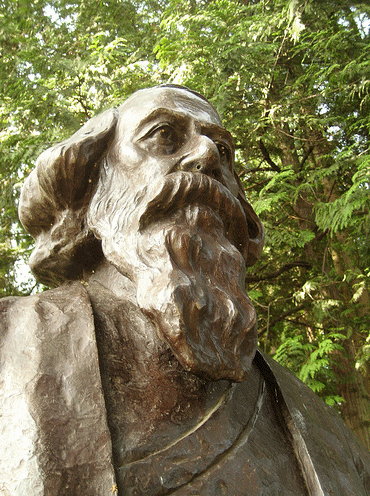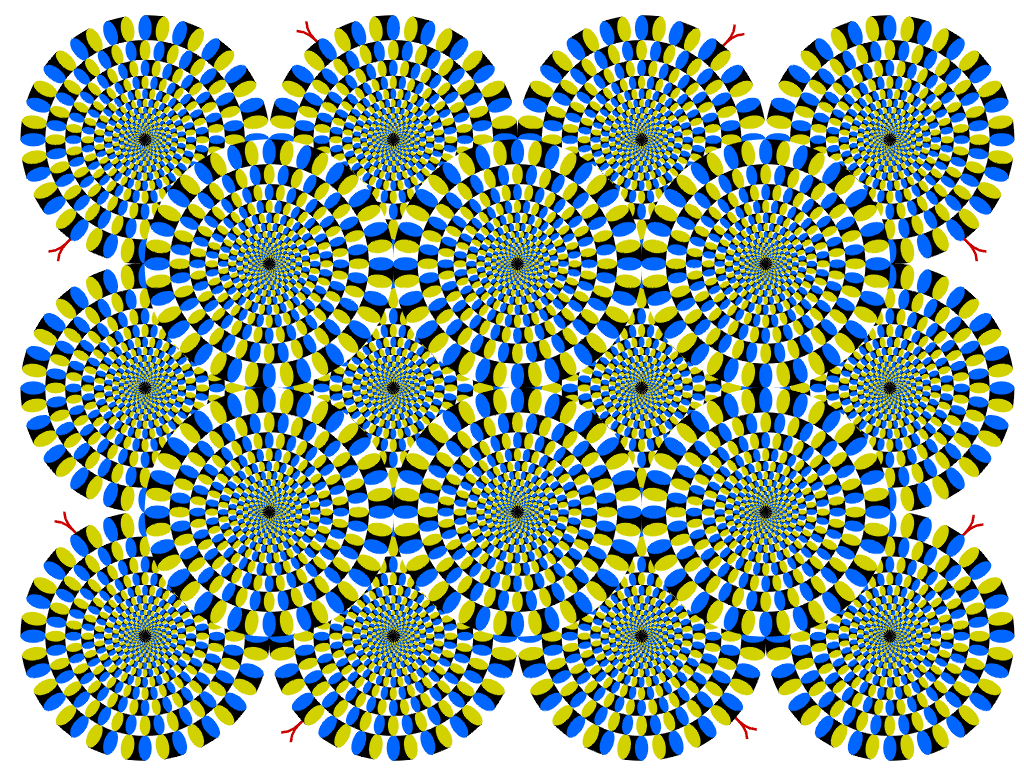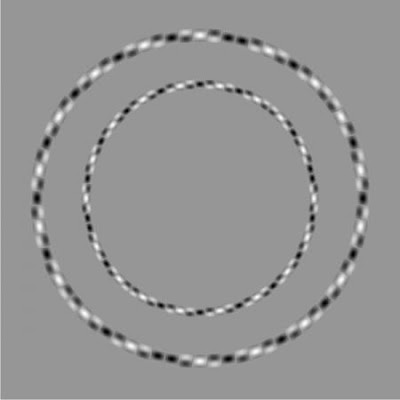

|
Brahms is known as the most serious and intellectual of the 19th Century romantic composers. Schoenberg has a reputation for being cerebral. (Some would say that his music works better for analysis than listening.) But this Gypsy dance is pure fun. It was composed by Brahms in 1861 as part of a piano quartet, orchestrated by Schoenberg in 1937. About his motivation for transcribing the piece, Schoenberg wrote: ‘I like the piece. It is seldom played. It is always very badly played, because the better the pianist, the louder he plays and you hear nothing from the strings. I wanted for once to hear everything, and this I achieved.’ Listen to the Brahms/Schoenberg Rondo alla Zingarese |
1 August 2008
|
|
A Moment’s Indulgence I ask for a moment’s indulgence to sit by thy side. Away from the sight of thy face my heart knows no rest nor respite, Today the summer has come at my window with its sighs and murmurs; Now it is time to sit quiet, face to face with thee, — Rabindranath Tagore |
2 August 2008
|
|
Your less-developed senses Walk with your eyes closed. Hold a friend’s hand and walk long enough that you become sensitized to the sounds in your ears and textures under your feet. Ask your friend to put your hand on objects that may be familiar of unfamiliar by sight. Try not simply to identify them, but to experience them anew. Walk on your own with your eyes closed for 10 steps, then blink your eyes open for a snapshot sufficient to sustain you another 10. Increase to 15, then 20 steps or more. Sense impending objects with subtle changes in the sound ambiance. Navigate a mile or more this way, and use the technique to play with your sense of place and continuity of your environment. Go for a summer walk through the woods on a moonless night. — Josh Mitteldorf |
3 August 2008
|
|
Our whole life is an attempt to discover when our spontaneity is whimsical, sentimental irresponsibility and when it is a valid expression of our deepest desires and values. |
4 August 2008
|
|
The Concealed Deer There was a woodcutter in Cheng who came across a frightened deer in the country and shot and killed it. Afraid that other people might see it before he could bring it home, he hid it in a grove and covered it with chopped wood and branches, and was greatly delighted. Soon afterwards, however, he forgot where he had hid the deer, and believed it must have all happened in a dream. As a dream, he told it to everybody in the streets. Now among the listeners there was one who heard the story of his dream and went to search for the concealed deer and found it. He brought the deer home and told his wife, ‘There is a woodcutter who dreamed he had killed a deer and forgot where he hid it, and here I have found it. He is really a dreamer!’ ‘You must have dreamed yourself that you saw a woodcutter who had killed a deer. Do you really believe that there was a real woodcutter? But now, you have really got a deer, so your dream must have been a true one,’ said his wife. ‘Even if I’ve found this deer by a dream,’ answered the husband, ‘what’s the use of worrying whether it is he who was dreaming or I?’ That night, the woodcutter went home, still thinking of his deer, and he really had a dream, and in that dream, he dreamed back the place of hiding of the deer and also of its finder. Early at dawn, he went to the finder’s house and found the deer there. The two then had a dispute and they went to a judge to settle it. And the judge said to the woodcutter: ‘You really killed a deer and thought it was a dream. Then you really had a dream and thought it was reality. He really found the deer and is now disputing with you about it, but his wife thinks he had dreamt that he had found a deer shot by someone else. Hence no one really shot the deer. Since we have the deer before our eyes, you may divide it between you two.’ The story was brought to the ears of the King of Cheng, and the King said, ‘Ah, ah! Isn’t the judge dreaming again that he is dividing the deer for people!’ — Lieh Tzu, translation by Lin Yutang |
5 August 2008
|
|
The dream of God May we not imagine that possibly this earthly life of ours is to the other life what sleep is to waking? May not all our life be a dream and death an awakening? But an awakening to what? And supposing everything is but the dream of God and that God one day will awake? Will he remember his dream? — Miguel de Unamuno (1864-1936) |
6 August 2008
|
|
Sojourns in the Parallel World We live our lives of human passions, ~ Denise Levertov ~ |
7 August 2008
|
|
How is the war going really? I want your honest opinion. Charles A Dana, born this day in 1819, was a fiercely independent journalist during the Civil War, who followed General Grant and reported his monstrous errors of judgment along with his brilliant successes. It is a striking contrast to modern political practice that Dana had direct access to President Lincoln. His telegraphed dispatches from the front lines were eagerly received in the White House, and Lincoln valued his unvarnished observations. Very late in the war, Dana was appointed to an official capacity as Under-secretary of War, as he continued the same reportage with a new title. A close confidant of Ulysses Grant, Dana supported his Presidential campaign, but later revealed his problems with alcohol to the public, and ruthlessly criticized Grant’s failings as President. Today, the American tradition of independent journalism has not abandoned us, but it has been pushed out of the established press onto the Internet, where it is partially drowned amid unreliable and amateurish rantings. Some of my favorites: Bradblog OpEdNews TalkingPoints CommonWonders NewsFromUnderground VDare GregPalast ThomHartmann CounterPunch InformationClearingHouse ‘Fight for your opinions, but do not believe that they contain the
whole truth or the only truth.’ |
8 August 2008
|
|
‘All great ideas originate with the lower classes.’ |
9 August 2008
|
|
In youth, love is identified with wanting. In maturity, love becomes an expansion of caring. We may need to care, but there is no need for neediness in our caring; caring can be carefree. — Josh Mitteldorf |
10 August 2008
|
|
Democracy in China HONG KONG - While China’s crackdown on Tibet and heavy-handed approach to dissidents in general have reinforced its international image as a ruthless, totalitarian state ahead of next month’s Summer Olympic Games, the reality on the ground is that the Middle Kingdom has never been more democratic and is, step by small step, becoming even more so. That reality was bolstered with the recent announcement by the Chinese Communist Party (CCP), as reported by the official Xinhua News Agency, that it has adopted a ‘tenure system’ that will give real power to traditionally rubber-stamp delegates to party congresses. In the past, party elites made all the decisions. The future could be quite different — but that all depends on implementation of the new system... The great difference between the dictator Mao and those currently wielding power, however, is that today’s leadership understands that, without democratic reform, the country risks widespread social unrest that could ultimately bring down the party. — Kent Ewing, writing in the Chinatown Report |
11 August 2008
|
|
Nurture thy creative engine! It’ s the source of your original contribution to your community and to those you love. It’s the essential ‘you’. Whatever it takes to keep that part of you healthy and active is what you must do for yourself. Then you must give it time. Make your appointment with the muse. Keep it faithfully, even when your muse is in hiding. — Josh Mitteldorf |
12 August 2008
|
|
Reclaiming the naïve vision “Habitualization devours works, clothes, furniture, one’s wife, and the fear of war. … And art exists that one may recover the sensation of life; it exists to make one feel things, to make the stone stony. The purpose of art is to impart the sensation of things as they are perceived and not as they are known. The technique of art is to make objects ‘unfamiliar’, to make forms difficult, to increase the difficulty and length of perception because the process of perception is an aesthetic end in itself and must be prolonged. Art is a way of experiencing the artfulness of an object; the object is not important.” — Victor Shklovsky, from Art as Technique (1917) |
13 August 2008
|
|
On water’s meaning ... he scissors the waterscape apart |
14 August 2008
|
|
The uses of paranoia Alan Wall speaks of paranoia as the psychic force animating the mythology of our time. ‘Is there a fundamental link, in the era of modernity at any rate, between the paranoid and the poetic?’ We transform horror and the unbearable sadness of loss — visions that threaten to isolate and destroy us — into myths that pull us together. ‘The Warren Report on the Kennedy assassination might be taken as one of the founding texts of American paranoid fiction. It opened a gap between information and credibility into which the fiction and the irony have never ceased rushing ever since. The present status of the commissions and reports into 9/11 doesn’t give much hope that they will do more than fill a parallel slot in the psyche.’ Marina Warner nominates candidates for myths to embody our fears for the future of our planet. It seems to me that Erichsychthon makes a strong candidate in the world of eco-disaster: he’s the tycoon in Ovid who cuts down a whole forest even after he has been warned of the consequences, and is then cursed by the outraged goddess of nature with unappeasable hunger; he ends up selling his daughter for food, and when that no longer works, consuming himself bite by bite. Other myths of our time could be the wanderers and fugitives – Io chased from country to country; Leto forbidden from resting anywhere to give birth to her children; Aeneas leaving Troy in burning ruins with his father on his back, like Dido leaving Tyre, both of them fleeing westwards. Last year, the most recently discovered planet, ‘2003-UB313’, was renamed Eris after the Goddess of Strife, whose actions catalyse the Trojan War....However, it turns out that astronomers weren’t inspired to this choice by the state of the world, but by the state of their profession. In a spirit of resistance to Eris’s planetary hold, I hope another body is orbiting into view, dreamed up by a fabulist’s reasoned imagination and bringing with it new creatures out of the mirror of myth. |
15 August 2008 |
|
We decide what is important while we are asleep ‘Sleep is a smart, sophisticated process. You might say that sleep is
actually working at night to decide what memories to hold on to and what
to let go of.’ Many experiments have established the role of sleep in consolidating memories. A new Harvard Med School study just published in Psychological Science suggests that memories are filtered for emotional content while we sleep, and the ones that have moved us are selectively retained. |
16 August 2008
|
|
One day you will awaken and see that your whole previous life was as a dream or hallucination. It will not be, “I can’t believe I spent my time working for money to buy a bigger car.” More like, “I can’t narrow my vision now to 3 dimensions, but I remember that for decades it seemed to me that’s all that there was.” Or perhaps, “As I remember it, it seemed to me that I spent my whole life worrying that I might die.” — Josh Mitteldorf |
17 August 2008
|
|
The blame-China syndrome It’s open season on China, newly installed as the world’s largest
emitter of carbon dioxide. Last week the Netherlands Environmental
Assessment Agency said China’
s economy was responsible for two-thirds of
the global increase in CO2 emissions last year. The week
before, the environment group WWF calculated that China uses 15 per cent
of the world’s resources. It builds two coal-fired power stations a
week, manufactures half the world’s cement and is the world’s largest
importer of tropical timber. |
18 August 2008
|
|
Religio laici In this extended poetic investigation, John Dryden seeks to justify his Christian faith in the context of ancient animist religions as well as the non-denominational ‘Deism’ that is the fashion of intellectuals of his era. Here is the conclusion at which he arrives, espousing tolerance, a non-confrontational deportment, and humility in the face all that we do not know:
What then remains, but, waving each extreme, — John Henry Dryden, born this day in 1631 |
19 August 2008
|
|
The ‘sexually deceptive’ orchid Chiloglottis trapeziformis attracts
males of its pollinator species, the thynnine wasp Neozeleboria
cryptoides, by emitting a unique volatile compound,
2-ethyl-5-propylcyclohexan-1,3-dione, which is also produced by female
wasps as a male-attracting sex pheromone. Strategies of deception are all over the biosphere, and one of
the highest purposes of flexible intelligence is to make judgments
that help us avoid being deceived. Another of the highest purposes
is to help us deceive others. ‘...animal communication is
largely reliable—but that this basic reliability also allows the
clever deceiver to flourish.’ |
20 August 2008
|
|
Motion from stasis
|
21 August 2008 Click on image to see rolling waves
Both wiggly lumps are actually true circles. |
|
The wages of fear Grasshoppers can be so afraid of wolf spiders that they will starve to death rather than come out of hiding and feed in the presence of the spider. In a June research paper, ecologists Evan Preisser and Daniel Bolnick found that the presence of a predator reduces activity rates of the prey by 45 percent in aquatic ecosystems and by 34 percent among those in terrestrial ecosystems. Paralysis from fear seems to be common in nature. Press release Are animals programmed by natural selection to be excessively risk-averse, so that they actually pay a bigger price for avoiding danger than they would probably pay if they just faced t the danger? …Of course, humans are much smarter and more rational than grasshoppers, and their measured response to danger would never cost them more than the actual risk justifies. Our much larger brains consistently support us to avoid panic and remain calm in the face of danger. I will face my fear. |
22 August 2008p>
|
|
The real roots of nonviolence I learnt the lesson of nonviolence from my wife, when I tried to bend her to my will. Her determined resistance to my will, on the one hand, and her quiet submission to the suffering my stupidity involved, on the other, ultimately made me ashamed of myself and cured me of my stupidity in thinking that I was born to rule over her and, in the end, she became my teacher in nonviolence. — Gandhi |
23 August 2008
|
|
Finesse Precision in art sensitizes the audience to nuances in its execution. When we sense that a pianist has exquisite control over the touch of each note, we instinctively listen for more subtle shades of meaning in the sound. When we realize that a poet is meticulous in his choice of words, we are willing to trust him, and invest more thought in interpreting his language. And when a visual artist chooses shades of color with great care, we are drawn into the tableau, and more attentive to its subtleties. In our conversations and expressions of opinion, we are building expectations that affect the way we will be heard 30 seconds or 30 years from now. The only way to preserve a full range of expressive power is to calibrate our words and our intonation to the demands of the occasion. If our speech is habitually strident, or we overuse draconian language, then it will soon be discounted. If we never use strong words, then we have forgone the opportunity to be effective when it is most important to us. — Josh Mitteldorf |
24 August 2008
|
|
School Prayer
In the name of the daybreak
I swear I will not dishonor
In the name of the sun and its mirrors
I will honor all life — Diane Ackerman, from I Praise My Destroyer |
25 August 2008
|
|
‘I have lived with several Zen masters, ... all of them cats.’
— Eckhart Tolle, from The Power of Now |
26 August 2008
|
|
“I don’t want any ‘yes-men’ around me. I want everybody to tell me the truth even if it costs them their jobs.” — Samuel Goldwyn actually named himself for Goldwyn Studios (forerunner of MGM) rather than the other way around. He claimed this day in 1882 as his birthday, though he was actually three years older. He left the Warsaw Ghetto which had been the only home he knew when he was orphaned at age 15. |
27 August 2008
|
|
World’s most successful animal There are two reasons the biosphere contains more mass in the form of termites than any other animal. One is their (eusocial) cooperative life style. The other is that they can live on wood. ‘[The termite] has attained a certain status as the pest that could solve our energy problems, transforming geopolitics and agriculture in the process...If we could turn wood waste into fuel with even a fraction of the termite’s efficiency, we could run our economy on sawdust, lawn clippings, and old magazines…’ |
28 August 2008
|
|
Shays Rebellion On this day in 1786, a New England farmer, former war hero of Bunker Hill, led a band of protestors who had become disillusioned with the American Revolution. They had fought bravely against the British, only to find themselves treated disdainfully by the new American Confederation. Their salary for the years of conscription was never paid, and the foreign debt accumulated in the war was passed down to small farmers. Homes, furnishings, and livestock were confiscated by debtor’s courts, while the wealthier landowners and merchants thrived. ‘I’ve labored hard all my days and fared hard. I have been
greatly abused, have been obliged to do more than my part in the war;
been loaded with class rates, town rates, province rates, Continental
rates, and all rates. . . been pulled and hauled by sheriffs, constables
and collectors, and had my cattle sold for less than they were worth.
I have been obliged to pay and nobody will pay me.’ ‘Rebellion against a king may be pardoned, or lightly punished, but
the man who dares to rebel against the laws of a republic ought to
suffer death.’ ‘A little rebellion now and then is a good thing . . . . God forbid
we should ever be twenty years without such a rebellion. The people
cannot be all, and always, well informed. The part which is wrong will
be discontented, in proportion to the importance of the facts they
misconceive. If they remain quiet under such misconceptions, it is
lethargy, the forerunner of death to the public liberty . . . . and what
country can preserve its liberties, if its rulers are not warned, from
time to time, that this people preserve the spirit of resistance? Let
them take arms. The remedy is to set them right as to the facts, pardon
and pacify them. What signify a few lives lost in a century or two? The
tree of liberty must be refreshed, from time to time, with the blood of
patriots and tyrants. It is its natural manure.’ Washington won this one. The protest was treated as an
insurrection, and put down brutally. |
29 August 2008
|
|
Mirrors “Moment to moment, the mind, the conditioning, is building some image of who it thinks it is. We think we’re the beautiful, pleasant states; we don’t want to be depression, anger, agitation, grief, frustration. We’re attached to one aspect as opposed to another and, therefore, fail to see the process out of which it’s all coming. “But it’s very difficult to see what’s real when we’re actively filtering all the input, when there is ‘someone’ in there trying to be something. The ‘I’ is reconstructed moment to moment out of our liking and disliking of what is happening in the mind. This acquired judgment of each thing which comes to mind picks and chooses among multiple thoughts and images to construct its house, which is constantly dissolving in the natural flow of mind. This ‘I’ is the facade chosen by mind to represent it. When choosing who we wish we were, we cull from the great mix an image here and there, and discredit the rest through some rationalization. What we choose, or what is allowed to remain, we call ‘I’— believing all the while that this ‘I’ is choosing rather than what actually has been chosen. Thus the imaginary ‘I’ is continually engaged in the compulsive activity of reforming itself. But this separate ‘I’, this aspect of mind which chooses among its own images for something to be, is just more mind, just another passing thought, a bubble.” Stephen Levine, from A Gradual Awakening my mind is |
30 August 2008
|
|
Fast track to enlightenment To anyone who imagines himself to be on a path of personal growth, a broken heart must be regarded as the supreme spiritual teacher. — Josh Mitteldorf |
31 August 2008
|































